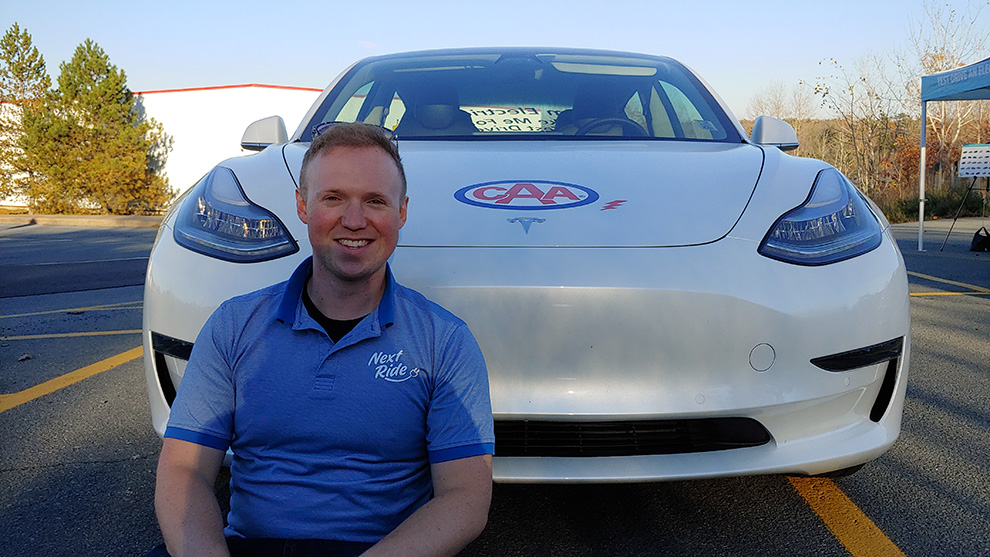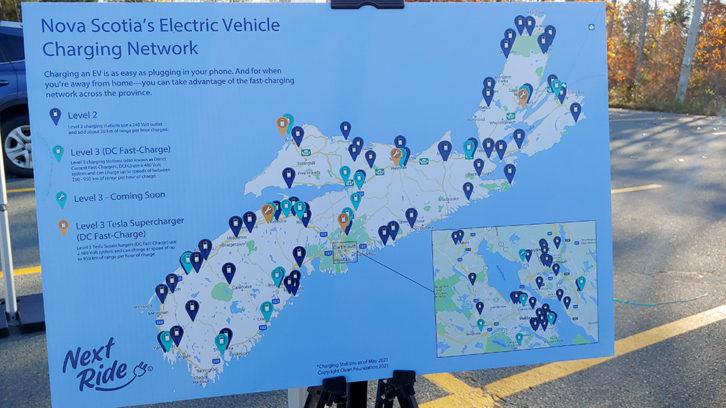Nova Scotia group lets public test-drive electric vehicles
Halifax’s emissions goal may be far away, but electric vehicles are driving a path towards zero

caption
Robert Purcell poses in front of a Tesla Model 3 during a Next Ride test-drive event on Tuesday.Robert Purcell didn’t hide his excitement as he talked about the Tesla Model 3 behind him. He and other volunteers greeted a steady row of people on Tuesday, each waiting for their turn to drive an electric vehicle.
Next Ride NS, a non-profit associated with the Clean Foundation, is hosting seven events where anyone can book a slot to test drive either a Tesla Model 3, or a Hyundai Kona EV. Purcell is a volunteer for the group, and while he doesn’t sell electric vehicles, he can still put you in the driver’s seat.
“We’re hoping to be the ones to supply a real test-drive, so they can get behind the wheel and actually experience the car,” Purcell said.
Next Ride works in partnership with the Clean Foundation to promote EVs, as part of their effort to support environmental sustainability.
It also promotes EVs on behalf of the province by managing Electrify, a program that gives rebates for EVs and E-bikes bought from businesses in Nova Scotia, with the same goal of promoting environmental sustainability.
EVs have become a tool for provincial and municipal governments in fighting climate change and reducing emissions. Non-profits like Next Ride are a way of promoting them to the public.
Why are electric vehicles important for Halifax?
With Halifax’s pledge to create a net-zero greenhouse gas emissions community by 2050, EVs are becoming more relevant to the city.
The transportation sector is the second highest energy consumer in the Halifax region, accounting for 30 per cent of energy use and 20 per cent of emissions. EVs create no emissions while driving. Plans to develop a municipal electric vehicle strategy were included in HalifACT, a plan approved by HRM in June 2020 to address climate change.
On Nov. 4, the environment and sustainability standing committee recommended that Halifax regional council adopt HRM’s municipal electric vehicle strategy, as put forward on Aug. 10.
The strategy highlights the Public Charging Infrastructure Plan, with the goal of improving access to public charging stations for EVs.
The two-phased plan would see widespread construction of public fast-charging stations in the first phase, followed by a strategy to “fill the remaining gaps,” and add charging capacity as needed in the second phase.
Charging stations and range anxiety
Range anxiety, the fear that an EV’s battery will run dry before it can reach a charging station, is cited in the document as a serious concern that keeps Nova Scotians from considering EVs.
The worry is common among EV detractors, although Purcell thinks infrastructure is less of a concern than most people think.
“I don’t want to say that the worry is not truthful, but maybe they don’t understand what the range of these cars actually is, and how many charging stations we actually have,” he said, noting a Chevy Bolt can go about 417 kilometres.
“If I ask them how much they drive in a day, they say 35 kilometres.”

caption
A graph from Next Rides of the public charging stations currently operational in Nova Scotia.Are EVs suitable for the average Nova Scotian?
EVs are currently not a popular option in the province. By the end of 2019, EVs made up less than one percent of annual vehicle sales, and only around 250 were registered in HRM.
But their popularity has grown in Halifax since then, and EV registration data from the provincial Department of Public Works shows that there are now over 500 registered in Halifax County.
Pricing may be a potential barrier. A stock Tesla Model 3 starts at $56,380. While the Kona EV is cheaper, it still starts at $45,000. The Chevrolet Bolt serves as Next Ride’s mascot, and while it isn’t available for a test drive at their events, it starts at $39,000.
Even so, Purcell thinks EVs are a good option for most Nova Scotians.
“Absolutely. The ranges that we have right now are more than suitable for most folks. You know, if you’re a travelling tradesperson in the winter, maybe look into a hybrid … but for the vast majority of folks, yes.”
The final Next Ride event will be Dec. 14 in Dartmouth.

